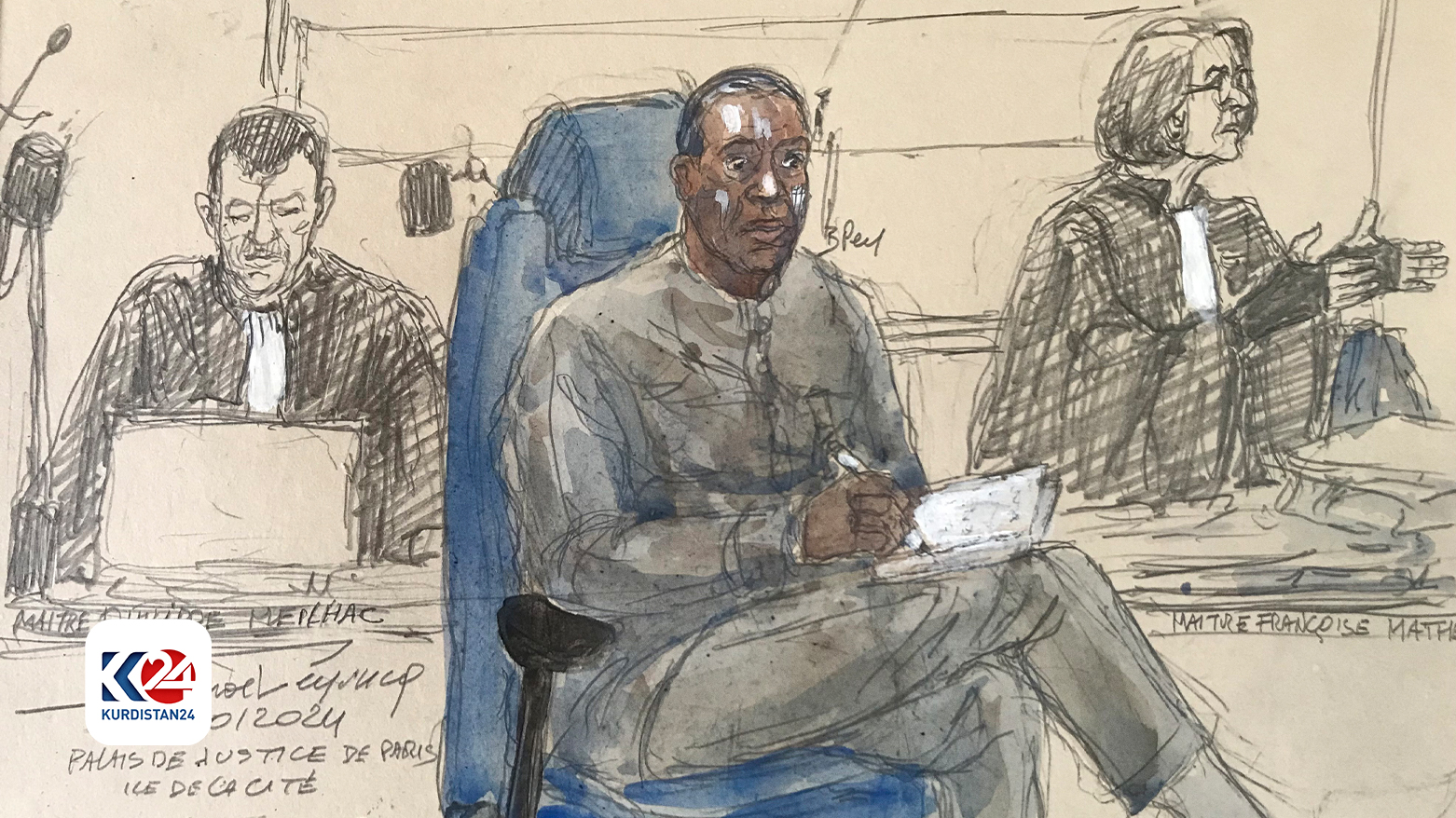French court opens trial for Rwandan genocide suspect
The trial marks a significant step in France’s ongoing efforts to hold individuals accountable for their roles in one of the most horrific atrocities of the 20th century.

ERBIL (Kurdistan24) – A landmark trial commenced in Paris on Tuesday, as Eugene Rwamucyo, a former Rwandan doctor, faced charges of genocide and crimes against humanity stemming from the 1994 Rwandan genocide.
The trial marks a significant step in France’s ongoing efforts to hold individuals accountable for their roles in one of the most horrific atrocities of the 20th century.
Rwamucyo, 65, is accused of actively supporting the Hutu-led government in disseminating anti-Tutsi propaganda and participating in mass killings.
He is also charged with conspiring to destroy evidence of genocide. The former doctor, who continued to practice medicine in France and Belgium after fleeing Rwanda, faces a potential life sentence if found guilty.
The trial, expected to last until October 29, is the eighth in France related to the 1994 genocide.
It comes amidst growing international pressure to bring justice to the perpetrators of the mass killings that claimed the lives of an estimated 800,000 people, primarily ethnic Tutsis.
The Rwandan genocide was a meticulously planned and executed campaign of violence that targeted the Tutsi minority population.
The Hutu-led government, with the support of extremist groups, orchestrated a systematic campaign of hate, incitement, and violence that culminated in widespread massacres across the country.
Rwamucyo’s trial is expected to shed light on the role of individuals like him who, despite their professional status, were implicated in the genocide.
The court will hear testimony from survivors, witnesses, and experts, providing a detailed account of the events of 1994 and the actions of those accused of perpetuating the violence.
The French judiciary has played a crucial role in investigating and prosecuting individuals connected to the Rwandan genocide.
The trial of Eugene Rwamucyo serves as a reminder of the importance of justice and accountability, even decades after such horrific events.
Rwanda Genocide
The Rwandan genocide of 1994 was a horrific event that claimed the lives of an estimated 800,000 people, mostly ethnic Tutsis.
It was a meticulously planned and executed campaign of violence that was fueled by decades of ethnic tensions and deep-seated hatred between the Hutu and Tutsi populations.
The roots of the genocide can be traced back to the colonial era, when the Belgian colonial authorities established a system of racial segregation.
In the early 1930s, the Belgian colonial administration implemented a system of racial categorization in Rwanda, dividing the population into three distinct ethnic groups: Hutu, Tutsi, and Twa.
This division was formalized through the issuance of compulsory identity cards that labeled individuals according to their assigned ethnicity.
The Hutu, representing the majority of the population at approximately 84%, were positioned below the Tutsi, who made up around 15%. The Twa, a smaller ethnic group, constituted about 1% of the population.
This rigid classification system effectively solidified ethnic identities and prevented any social or economic mobility between the groups.
Colonialism's Role in the Rwandan Genocide: A Forgotten Legacy
While the French government's involvement in the 1994 Rwandan genocide has been extensively debated, Belgium's role in shaping the events leading to the tragedy is often overlooked.
Le Monde diplomatique further clarifies this in a report.
As Le Monde explains in the report, Belgium's responsibility can be traced back to the early 20th century when it was granted administrative control over Rwanda and Burundi following World War I.
Lacking knowledge of the region, the Belgian colonial authorities opted for an indirect rule approach, relying on existing local structures.
In Rwanda, this meant preserving the monarchy, headed by a ‘mwami’, or sovereign, who ruled by divine right. However, Belgium's primary focus was on its neighboring colony, Congo, and it sought to minimize its investment in Rwanda and Burundi.
Influenced by prevailing scientific theories of the time, the Belgians became obsessed with classifying and differentiating 'races.' They mistakenly concluded that the Tutsis were of Hamitic or Nilotic origin, suggesting a superior lineage compared to the Hutu and Twa populations.
This flawed categorization laid the groundwork for future ethnic tensions and discrimination.
In Rwanda, the monarchy's legitimacy was deeply intertwined with religion. Belgian colonists and missionaries actively sought to undermine the authority of the mwami, Yuhi Musinga, eventually deposing him in 1931 for refusing to convert to Christianity.
The monotheistic cult of Imana, which had served as a unifying force, was replaced by Catholicism, and the Tutsis, seen as the 'aristocracy,' became the primary focus of the missionaries' attention.
Mass conversions to Christianity followed, further reinforcing the ethnic divisions established by the Belgian colonial administration.
In the decades following independence, tensions between the two groups continued to escalate. The Hutu-led government, which came to power in 1962, implemented policies that discriminated against Tutsis and marginalized them from political and economic life.
The genocide began in earnest in early 1994, following the assassination of President Juvénal Habyarimana, a Hutu.
Extremist Hutu groups, with the support of the government, launched a campaign of violence against Tutsis and moderate Hutus. The violence quickly spread across the country, with civilians being targeted in their homes, churches, and schools.
The international community failed to act decisively to prevent or stop the genocide.
The United Nations peacekeeping force, UNAMIR, was underfunded and undermanned, and it was unable to effectively protect civilians. The international response to the crisis was slow and inadequate, allowing the violence to escalate unchecked.
The genocide finally came to an end in July 1994, when the Rwandan Patriotic Front (RPF), a Tutsi rebel group led by Paul Kagame, captured the capital city of Kigali and established a new government.
However, the scars of the genocide continue to be felt in Rwanda today, and the country faces significant challenges in rebuilding its society and healing the wounds of the past.